Someone else is currently editing this document
Only one person can work on a document at a time
Diary 4: January - December 1937 Item 89
TRANSCRIPTION
Left page
I am not against Britain being prepared at a
certain stage, either to give up some of her vast colonial
possessions or to make new and equitable international
arrangements regarding their riches and strategical
importance, but I am convinced that any generosity
isolated from the essential problem of peace and general
settlement would be an act of gross misjudgment. I don't
think that the alternatives are immediate concessions, or
waiting for the colonies to be forcibly retaken. I would
reserve every major concession until the general settlement
approaches. I think that the first foundation for that
general settlement, which I still hope for, will be when
the Western powers, with I hope the United States behind
them, choose show that they will submit to no more threats
and no more blackmail. I rejoiced in the Nyon Conference from
no narrow motives, but because I believe that that was the
way to helping Europe (including Germany and Italy).
The relations between the "haves" and the
"have-nots" must be settled by concessions on the part
of the "haves" with regard to wealth and privileges and
on the part of the "have-nots" by submission to law or
lawful procedure. I think that some degree of justice
in international relationship is not only a dream; and it
can never be perfect, but it is the only hope for civilizing
international intercourse.
Last year when the colonial campaign was started
Right page
in Germany, I formed the opinion that it was not intended
to be pushed to realization - that it was at any rate
capable of two uses. One of these would of course be the
return of colonies, if that should not be too difficult,
but I prophesied (fully realizing how daring a thing it
is to prophesy about anything in the Europe of to-day)
that when the campaign reached a certain intensity and
when English Imperialists were alarmed there will be a
better chance of the deed ... which I thought lay nearer
to the Führer's heart: to give up, temporarily at any
rate, the claim to a colonial Empire in exchange for
Central and Eastern Europe! That alternative might not
be in all cases a question of territorial sovereignty.
This note is dictated and I am conscious of
its limitations, but you tempted me. Of course, if I
could enter in newspaper controversy, the letters of people
like Amery & Company with their smugness and cant,
might induce me also to join with you.
...
Astor is one of the so-called "pro-German" group
Lord Lothian, Major Astor ("The Times"), Ld Londonderry,
& Garvin of the "Observer"etc
Language(s) of Transcription
LOCATION
Gdańsk (Poland) (54.3612, 18.5499)
Story Location
ABOUT THIS DOCUMENT
Document Date
Document Type
Document Description
Language of Description
Keywords
External Web Resources
People
William Astor, 3rd Viscount Astor
Description: English businessman and politician
Wikidata Reference: Q2580935
Philip Kerr, 11th Marquess of Lothian
Description: British politician, diplomat and newspaper editor
Wikidata Reference: Q957575
Charles Vane-Tempest-Stewart, 7th Marquess of Londonderry
Description: British politician
Wikidata Reference: Q333368
STORY INFORMATION
Title
Diary 4: January - December 1937
Creator
Lester | Seán | 1888-1959
Contributor
Seán Lester
Lester, Seán, 1888-1959
Date
21 January 1937-?28 December 1937
Type
Text
Rights
This collection has been digitised and made available by Dublin City University Library. Please credit Dublin City University Library when using these images, creativecommons.org/licenses/by/4.0/
Language
eng
Identifier
#98818g003
LandingPage
https://www.europeana.eu/item/707/_98818g003Country
Ireland
DatasetName
707__Dublin_City_University
Begin
1936-05-01
End
1937-02-28
Language
en
Created
2022-03-23T16:13:34.244Z
2022-03-23T16:13:37.054271Z
2022-03-23T16:13:37.054820Z
Story Description
Handwritten and typed diary entries relating to Lester's time as Deputy Secretary General of the League of Nations in Geneva. Includes newspaper cuttings and a programme for a St Andrew's Day dinner, hosted by the Caledonian Society of Switzerland on 4 December 1937 (at which Lester was a speaker).
TRANSCRIPTION
LOCATION
DESCRIPTION
PEOPLE
STORY INFO
TUTORIAL
Left page
I am not against Britain being prepared at a
certain stage, either to give up some of her vast colonial
possessions or to make new and equitable international
arrangements regarding their riches and strategical
importance, but I am convinced that any generosity
isolated from the essential problem of peace and general
settlement would be an act of gross misjudgment. I don't
think that the alternatives are immediate concessions, or
waiting for the colonies to be forcibly retaken. I would
reserve every major concession until the general settlement
approaches. I think that the first foundation for that
general settlement, which I still hope for, will be when
the Western powers, with I hope the United States behind
them, choose show that they will submit to no more threats
and no more blackmail. I rejoiced in the Nyon Conference from
no narrow motives, but because I believe that that was the
way to helping Europe (including Germany and Italy).
The relations between the "haves" and the
"have-nots" must be settled by concessions on the part
of the "haves" with regard to wealth and privileges and
on the part of the "have-nots" by submission to law or
lawful procedure. I think that some degree of justice
in international relationship is not only a dream; and it
can never be perfect, but it is the only hope for civilizing
international intercourse.
Last year when the colonial campaign was started
Right page
in Germany, I formed the opinion that it was not intended
to be pushed to realization - that it was at any rate
capable of two uses. One of these would of course be the
return of colonies, if that should not be too difficult,
but I prophesied (fully realizing how daring a thing it
is to prophesy about anything in the Europe of to-day)
that when the campaign reached a certain intensity and
when English Imperialists were alarmed there will be a
better chance of the deed ... which I thought lay nearer
to the Führer's heart: to give up, temporarily at any
rate, the claim to a colonial Empire in exchange for
Central and Eastern Europe! That alternative might not
be in all cases a question of territorial sovereignty.
This note is dictated and I am conscious of
its limitations, but you tempted me. Of course, if I
could enter in newspaper controversy, the letters of people
like Amery & Company with their smugness and cant,
might induce me also to join with you.
...
Astor is one of the so-called "pro-German" group
Lord Lothian, Major Astor ("The Times"), Ld Londonderry,
& Garvin of the "Observer"etc
- English (English)
Left page
I am not against Britain being prepared at a
certain stage, either to give up some of her vast colonial
possessions or to make new and equitable international
arrangements regarding their riches and strategical
importance, but I am convinced that any generosity
isolated from the essential problem of peace and general
settlement would be an act of gross misjudgment. I don't
think that the alternatives are immediate concessions, or
waiting for the colonies to be forcibly retaken. I would
reserve every major concession until the general settlement
approaches. I think that the first foundation for that
general settlement, which I still hope for, will be when
the Western powers, with I hope the United States behind
them, choose show that they will submit to no more threats
and no more blackmail. I rejoiced in the Nyon Conference from
no narrow motives, but because I believe that that was the
way to helping Europe (including Germany and Italy).
The relations between the "haves" and the
"have-nots" must be settled by concessions on the part
of the "haves" with regard to wealth and privileges and
on the part of the "have-nots" by submission to law or
lawful procedure. I think that some degree of justice
in international relationship is not only a dream; and it
can never be perfect, but it is the only hope for civilizing
international intercourse.
Last year when the colonial campaign was started
Right page
in Germany, I formed the opinion that it was not intended
to be pushed to realization - that it was at any rate
capable of two uses. One of these would of course be the
return of colonies, if that should not be too difficult,
but I prophesied (fully realizing how daring a thing it
is to prophesy about anything in the Europe of to-day)
that when the campaign reached a certain intensity and
when English Imperialists were alarmed there will be a
better chance of the deed ... which I thought lay nearer
to the Führer's heart: to give up, temporarily at any
rate, the claim to a colonial Empire in exchange for
Central and Eastern Europe! That alternative might not
be in all cases a question of territorial sovereignty.
This note is dictated and I am conscious of
its limitations, but you tempted me. Of course, if I
could enter in newspaper controversy, the letters of people
like Amery & Company with their smugness and cant,
might induce me also to join with you.
...
Astor is one of the so-called "pro-German" group
Lord Lothian, Major Astor ("The Times"), Ld Londonderry,
& Garvin of the "Observer"etc
Language(s) of Transcription
English Translation
Transcription History
Left page I am not against Britain being prepared at a certain stage, either to give up some of her vast colonial possessions or to make new and equitable international arrangements regarding their riches and strategical importance, but I am convinced that any generosity isolated from the essential problem of peace and general settlement would be an act of gross misjudgment. I don't think that the alternatives are immediate concessions, or waiting for the colonies to be forcibly retaken. I would reserve every major concession until the general settlement approaches. I think that the first foundation for that general settlement, which I still hope for, will be when the Western powers, with I hope the United States behind them, choose show that they will submit to no more threats and no more blackmail. I rejoiced in the Nyon Conference from no narrow motives, but because I believe that that was the way to helping Europe (including Germany and Italy). The relations between the "haves" and the "have-nots" must be settled by concessions on the part of the "haves" with regard to wealth and privileges and on the part of the "have-nots" by submission to law or lawful procedure. I think that some degree of justice in international relationship is not only a dream; and it can never be perfect, but it is the only hope for civilizing international intercourse. Last year when the colonial campaign was started Right page in Germany, I formed the opinion that it was not intended to be pushed to realization - that it was at any rate capable of two uses. One of these would of course be the return of colonies, if that should not be too difficult, but I prophesied (fully realizing how daring a thing it is to prophesy about anything in the Europe of to-day) that when the campaign reached a certain intensity and when English Imperialists were alarmed there will be a better chance of the deed ... which I thought lay nearer to the Führer's heart: to give up, temporarily at any rate, the claim to a colonial Empire in exchange for Central and Eastern Europe! That alternative might not be in all cases a question of territorial sovereignty. This note is dictated and I am conscious of its limitations, but you tempted me. Of course, if I could enter in newspaper controversy, the letters of people like Amery & Company with their smugness and cant, might induce me also to join with you. ... Astor is one of the so-called "pro-German" group Lord Lothian, Major Astor ("The Times"), Ld Londonderry, & Garvin of the "Observer"etc
English Translation
Automatically Identified Enrichments
Verify Automatically Identified Enrichments
Verify Automatically Identified Locations
Verify Automatically Identified Persons
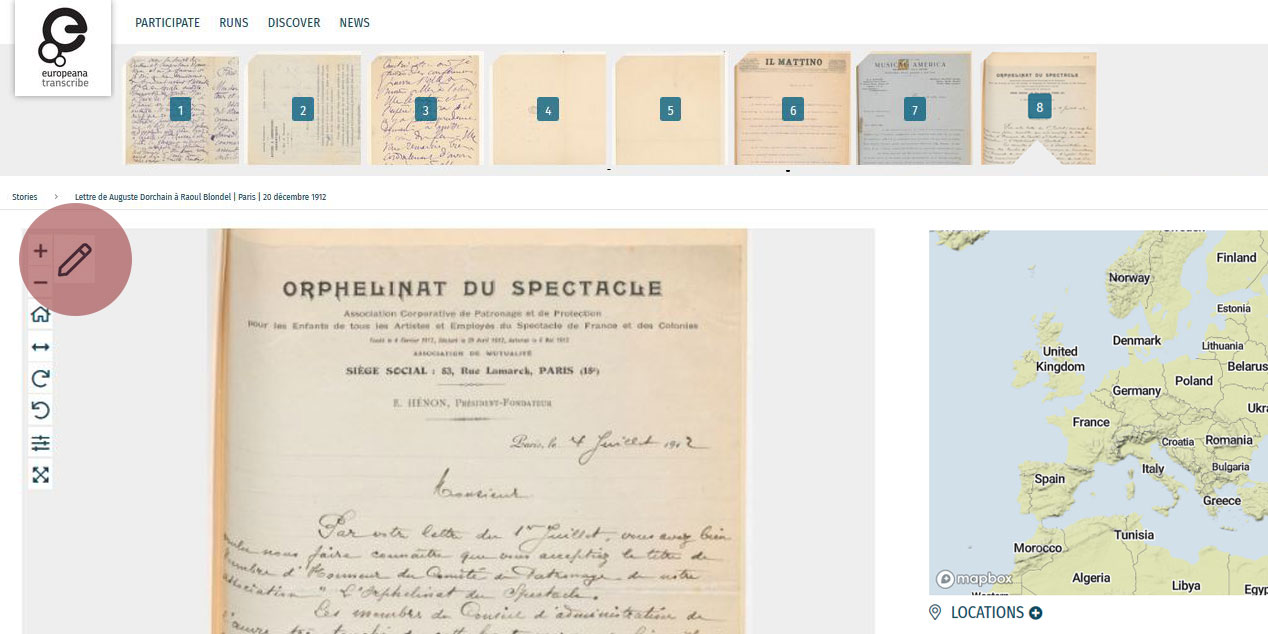
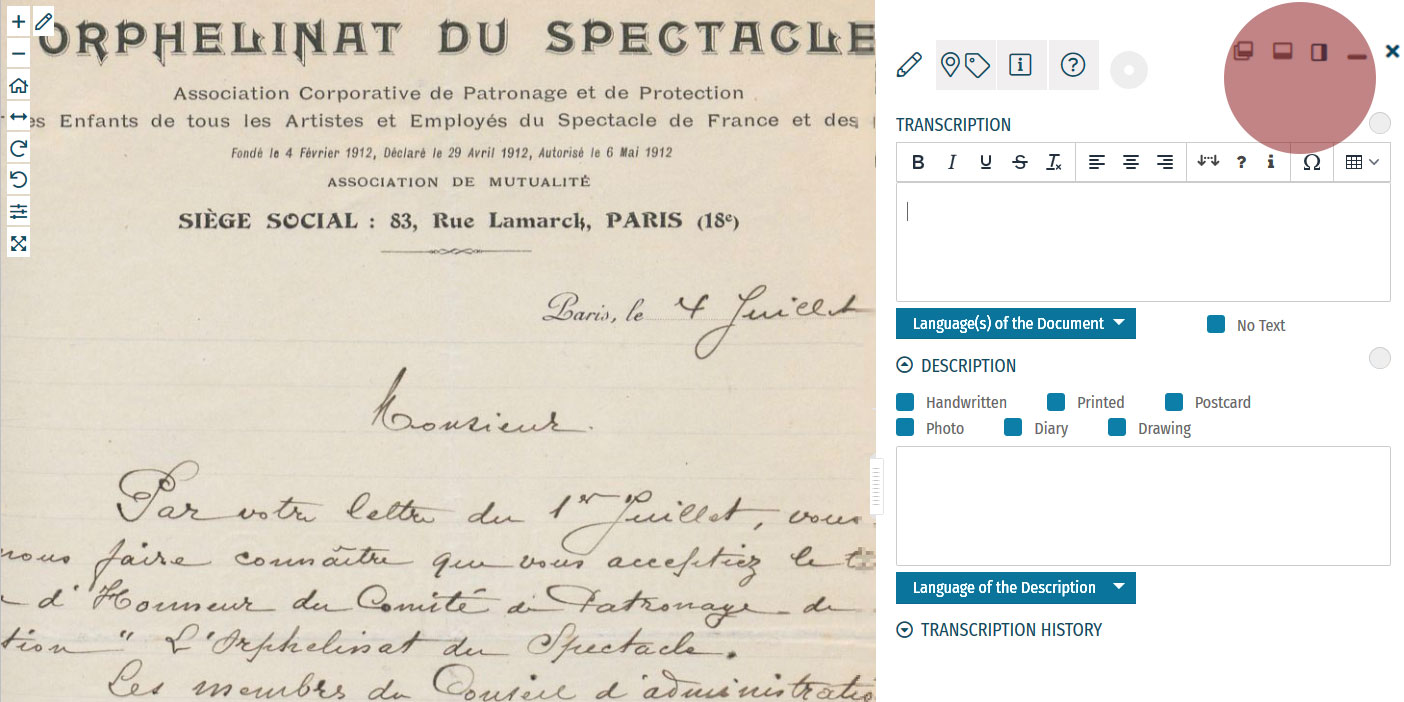
Enrichment Mode
Edit your workspace view by using the top-right menu.
You can have the white Activity Panel docked to the right (default) , to the bottom , or as an independent overlay . If you just want to view the image, you can hide the panel using the minimise button , and then re-open it with the pen button. Adjust the size and position of your Activity Panel according to your preferences.
You enrich documents by following a step-by-step process.
Make sure you regularly save your enrichments in each step to avoid the risk of losing your work.
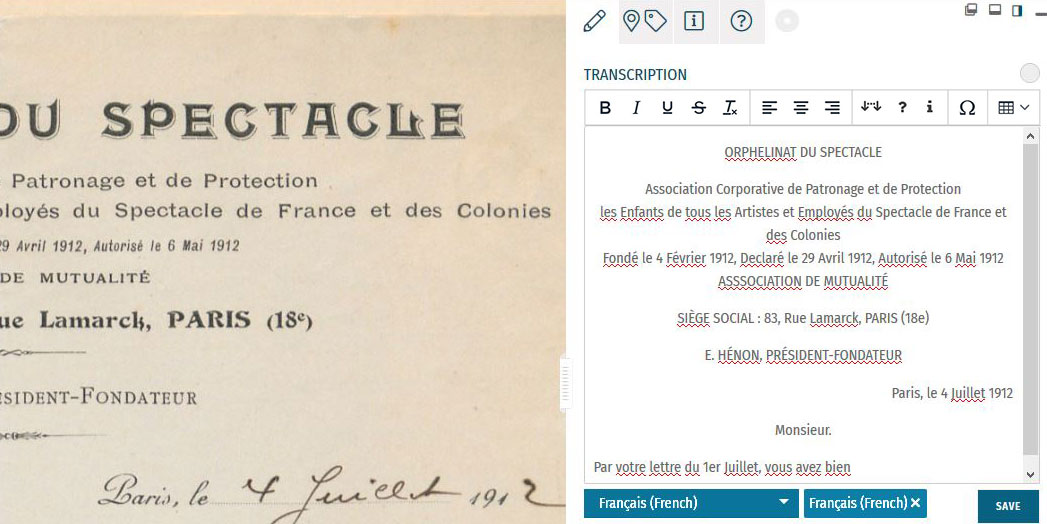
Step 1: Transcription
To start a transcription, select the transcription tab at the top menu of the Activity Panel. Click inside the box underneath the heading TRANSCRIPTION and start writing your transcription. When needed, use the toolbar to format your text and to add special characters and tables. A guide to the transcription toolbar is available in the Formatting section of this tutorial.
Identify the language(s) of the text using the dropdown list under the transcription box. You can select multiple languages at once.
If the item has no text to transcribe, tick the checkbox ‘No Text’.
Once you have finished your transcription, click SAVE.
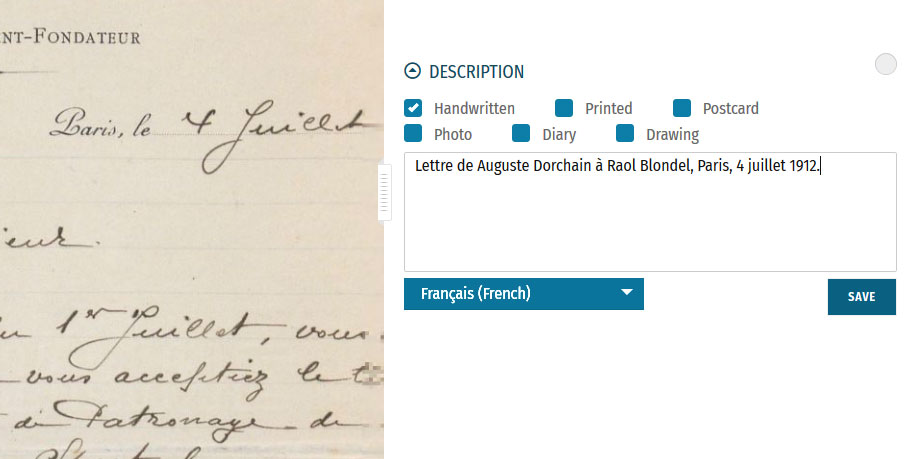
Step 2: Description
You can add a description to the item underneath the Transcription section.
The first task is to identify what type of document the item is: a handwritten or printed document, a postcard, photo, drawing and/or part of a diary. Tick the category which best applies to the item. Multiple categories can be selected at once.
The second task is to write a description of the contents. Click inside the box underneath the heading DESCRIPTION. Here, you can write what the item is, what it is about, and specify the images and objects that appear in the item.
Identify the language of the description text that you wrote using the dropdown list underneath. You can only select one language.
Once you have finished your description, click SAVE.

Step 3: Location
If you find a location mentioned or recognise a place in the item, you can create a geotag and pin it to the item map. Multiple locations can be attached to the item. To tag locations, select the tagging tab at the top menu of the Activity Panel. Click the plus next to the heading LOCATIONS. Type the location into the search bar and select the result that best applies. A new pin will be placed into the map. The location name should be a clear georeference, e.g. a country, city or address. Make adjustments to the location name if necessary. You can also adjust the position of the pin by dragging it on the map. If you want to add further details to the location, you can write a (short) description. This could include extra information about the geotag (e.g. the building name or a significant event that took place at the location) or the relevance of the place to the item (e.g. the hometown of the author). You can also add a Wikidata reference to link the location to a stable source. Search for the reference using the Wikidata fields. Once you have finished your location tag, click SAVE. You can find the place(s) tagged to the item in grey at the bottom of the Location(s) section.Step 4: Tagging
Below the Locations section is the Tagging section, where you can add the following annotations:
 Document Date:
Document Date:Here, you can add dates that correspond to the item. This could include the dates mentioned in the text (e.g. in diary pages), the date of a related historical event (e.g. the end of WWI), or when the item was created (e.g. from a dated signature on an illustration). You can either define this as a single date or as a longer time frame.
To tag dates to the item, write the start and end dates in DD/MM/YYYY format in the fields or select the dates by clicking on the calendar.
If you only have one date to add, insert the same date into both start and end fields.
If you don’t know the exact days, you can also tag the date on the scale of months (MM/YYYY) or years (YYYY).
Once you have finished your date tag, click SAVE DATE.
 People:
People:People mentioned as creators or subjects in the item can also be tagged. Depending on the information you might have, you can enter the person’s first and last names, as well as their dates of birth and death. There is also the option to write a short description of the person, explaining who they are or their relevance to the item, e.g. the person’s occupation or their relation to another tagged person.
Multiple people can be tagged to one item.
Once you have finished your person tag, click SAVE.
 Keywords:
Keywords:Here, you can freely add keywords related to the topic and content of the item. This could include particular themes (e.g. art, music, war), subjects (e.g. children, cooking, France), or particular historical affiliations (e.g. 20th century, Austro-Hungarian Empire, Fall of the Iron Curtain).
Multiple keywords can be added and they can be written in any language.
Write your keyword tag into the field and click SAVE.
 Other Sources:
Other Sources:External websites with information about the item’s content can be linked here. This could include links to further data about a person mentioned, a particular historical event or links to digital versions of newspapers that appear in photos or clippings in a notebook.
To add a link, click the plus next to the heading ‘Other Sources’. Enter the URL into the Link field, and write a short description of this link in the Additional Description field.
Multiple links can be tagged to one item.
Once you have finished your tag, click SAVE.
Step 5: Mark for Review
Once you have saved your contribution, the task will automatically change to the Edit status. If you think the task is finished, you can mark it for review. Note that you have to be at Runner level or above to do this (see: Miles and Levels). Click on the yellow circle next to the section heading and select Review in the list that appears. The task now needs to go under Review by another volunteer.Formatting
Review
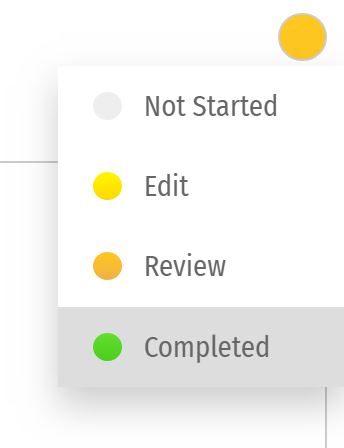 All enrichments need to be edited and reviewed by more than one volunteer to ensure that they are as accurate as possible.
Only Sprinters and Champions can edit tasks in the Review stage and mark them as Complete. (see: Miles and Levels)
You can review a task (Transcription, Description, Locations, or Tagging) when the circle next to the heading is coloured orange .
During the review process, pay close attention to the following requirements:
All enrichments need to be edited and reviewed by more than one volunteer to ensure that they are as accurate as possible.
Only Sprinters and Champions can edit tasks in the Review stage and mark them as Complete. (see: Miles and Levels)
You can review a task (Transcription, Description, Locations, or Tagging) when the circle next to the heading is coloured orange .
During the review process, pay close attention to the following requirements:
-
- Transcription: The complete text in the item has been properly transcribed and the transcription is formatted as accurately as possible. The correct language(s) are selected and the transcription contains no missing or unclear icons.
-
- Description: The description is accurate and detailed (especially items without text to transcribe, e.g. photos), and the appropriate categories have been ticked.
-
- Location(s): All locations have been correctly tagged. The location name is accurate and matches the coordinates and the pin on the map. The description is clear and concise, and the Wikidata reference (if any) is correct.
-
- Tagging: Document dates are completed and as precise as possible. All mentioned people are tagged and their data is correct. All added keywords are applicable to the item, and other sources have accurate information and functioning links.
Completion Statuses
| GREY |
| 1. NOT STARTED |
| Tasks have not been started. |
| YELLOW |
| 2. EDIT MODE |
| Tasks have been started, but not yet finished. Additions and edits can still be made. |
| ORANGE |
| 3. REVIEW |
| Tasks are finished, but need final review by Sprinter or Champion transcribers. |
| GREEN |
| 4. COMPLETED |
| Tasks have been fully completed and reviewed. No further changes need to be made. |
Miles and Levels
Transcribathon is a competitive marathon. You do not enrich documents alone, but compete and work with other volunteers to ensure the quality of your work. When you first create a Transcribathon account, you only have the ability to start and edit tasks. The more you enrich documents, the closer you become to advancing to a higher level, which can unlock abilities like reviewing and completing tasks.| Level | Abilities |
|---|---|
| Trainee | Basic abilities: start and edit tasks |
| Runner | Basic abilities, mark finished tasks for review |
| Sprinter | All Runner abilities, mark reviewed annotations as completed |
| Champion | All Sprinter abilities, mark reviewed transcriptions as completed |
| Tasks | Miles Received |
|---|---|
| Transcription | 1 Mile for every 300 characters transcribed |
| Description | 1 Mile for every 5 Descriptions added |
| Location | 1 Mile for every 5 Locations added |
| Tagging | 1 Mile for every 5 Tags added |
| Reviewing | 1 Mile for every 10 items marked as complete |
